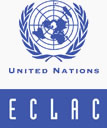A report by the UN Economic Commission for Latin America and the Caribbean (ECLAC) calculates that, in a 2.5°C temperature rise scenario, the economic costs of climate change will equal to approximately 2.5% of the region's annual gross domestic product (GDP).
The study notes that the region is faced with “an asymmetrical dual challenge” given its limited contribution to total greenhouse gas (GHG) emissions and high vulnerability to climate change.
It estimates the annual adaptation costs for the region at approximately 0.5% of the region's annual GDP.
 22 September 2014: A report by the UN Economic Commission for Latin America and the Caribbean (ECLAC) calculates that, in a 2.5°C temperature rise scenario, the economic costs of climate change will equal approximately 2.5% of the region’s annual gross domestic product (GDP). The study notes that the region is faced with “an asymmetrical dual challenge” given its limited contribution to total greenhouse gas (GHG) emissions and high vulnerability to climate change. It estimates the annual adaptation costs for the region at approximately 0.5% of the region’s annual GDP.
22 September 2014: A report by the UN Economic Commission for Latin America and the Caribbean (ECLAC) calculates that, in a 2.5°C temperature rise scenario, the economic costs of climate change will equal approximately 2.5% of the region’s annual gross domestic product (GDP). The study notes that the region is faced with “an asymmetrical dual challenge” given its limited contribution to total greenhouse gas (GHG) emissions and high vulnerability to climate change. It estimates the annual adaptation costs for the region at approximately 0.5% of the region’s annual GDP.
The report, titled ‘The Economics of Climate Change in Latin America and the Caribbean: Paradoxes and Challenges,’ was launched by ECLAC Executive Secretary Alicia Bárcena on 22 September 2014, in New York, US, in the lead up to the UN Climate Summit. The study: estimates the potential impacts of climate change in the region; reviews adaptation measures and their potential costs, in particular for the small island developing States (SIDS) of the Caribbean and Central America; and examines global and regional greenhouse gas (GHG) emissions. It also discusses the importance of a more balanced public-private matrix for improved quality of life and for combating climate change, with a special emphasis on consumption patterns in relation to transportation needs.
Speaking at the launch, Bárcena stressed that although the region’s GHG emissions only represent 9% of the global total, and increased at an average annual growth rate of 0.6% between 1990-2011, the region knows it “should be responsible in terms of emissions,” especially in agriculture and forestry, which are the key emitting sectors in Latin America. Nevertheless, she stressed that “for our region, adaptation is the name of the action that needs to be taken.”
The report calls for “Latin America and the Caribbean to implement a variety of adaptive strategies in order to significantly reduce the costs of climate change,” and notes that this will require “major structural modifications in the current development style,” which “displays a degree of inertia that is eroding the very factors that serve as its foundation.” As a solution, the report stresses the need for: thorough changes in the development paradigm; a global climate agreement pointing out directions towards a sustainable development path; and equality, social cohesion and a public-private matrix that support the new paradigm. [ECLAC Press Release] [ECLAC Publication Webpage] [Publication: The Economics of Climate Change in Latin America and the Caribbean: Paradoxes and Challenges] [ECLAC Press Briefing Webcast on UN WEB TV]